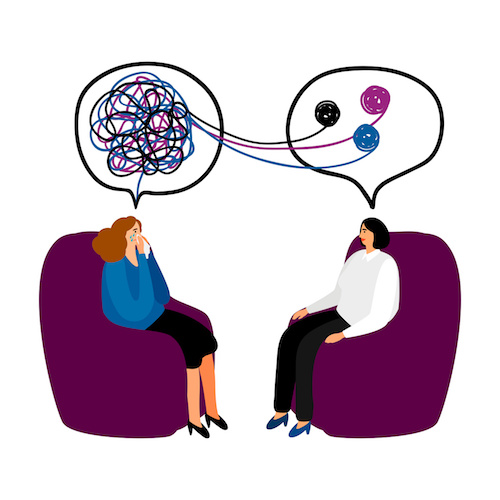Opening the Keys of Mental Health And Wellness: A Summary of Counseling and Therapy Choices
Mental wellness is a complex and crucial aspect of total health. Various therapy and therapy alternatives exist to address different emotional difficulties. Each strategy supplies one-of-a-kind advantages and approaches customized to individual needs. Recognizing these alternatives is crucial for anybody looking for to improve their mental health and wellness. Mental Health Resources. What aspects should one take into consideration when exploring these opportunities? The solution may expose a path to a healthier mood
Understanding Mental Wellness and Its Importance
Psychological health incorporates the psychological, emotional, and social wellness of individuals, significantly influencing exactly how they assume, feel, and act. Its relevance can not be overemphasized, as it affects every element of life, including partnerships, job performance, and total lifestyle. People with good mental health and wellness often tend to handle anxiety extra effectively, keep healthier partnerships, and make informed choices. On the other hand, bad psychological health and wellness can lead to psychological distress, impaired performance, and various mental illness, which might need professional treatment. Recognizing mental health and wellness is important for acknowledging the indications of distress and the demand for support. Recognition additionally promotes compassion and minimizes preconception, encouraging individuals to look for aid when needed. By focusing on psychological wellness, neighborhoods can promote environments that sustain emotional health, eventually bring about healthier, a lot more durable individuals. This foundation serves as a crucial action toward reliable mental health therapy and therapy choices.
Kinds Of Counseling Methods
Counseling approaches differ widely, each tailored to meet the unique needs of individuals seeking assistance. Among the most usual types are cognitive-behavioral treatment (CBT), which concentrates on identifying and transforming unfavorable idea patterns, and person-centered treatment, which stresses compassion and acceptance. Psychodynamic therapy explores past experiences and unconscious procedures to understand existing behavior, while solution-focused brief therapy intends to determine remedies rather than investigate problems.Additionally, family treatment addresses relational characteristics and communication within families, fostering much healthier interactions. Group counseling gives a common room for individuals to share experiences and sustain each other. Other methods include existential therapy, which motivates individuals to locate significance and function, and art or music therapy, which utilizes creative expression as a therapeutic device. Each approach supplies distinct techniques and ideologies, enabling clients to locate one of the most suitable technique for their individual development and recovery journeys.
Checking Out Various Therapy Modalities
In the domain of psychological health and wellness counseling, numerous treatment techniques offer unique techniques to treatment. Cognitive Behavior modification emphasizes the link between ideas and behaviors, while Psychodynamic Therapy checks out subconscious impacts on psychological wellness. Furthermore, Mindfulness-Based Techniques advertise present-moment recognition as a way to boost emotional guideline and overall mental wellness.
Cognitive Behavior Modification
Cognitive Behavioral Therapy (CBT) sticks out as one of the most commonly exercised and researched methods in mental wellness therapy. This strategy concentrates on the affiliation in between thoughts, feelings, and habits, highlighting that changing unfavorable thought patterns can result in boosted psychological health and behavioral changes. CBT is structured, commonly entailing a minimal number of sessions, and aims to gear up people with functional abilities to manage their symptoms. It is efficient for a selection of conditions, consisting of anxiousness disorders, clinical depression, and trauma. By making use of methods such as cognitive restructuring and exposure therapy, CBT cultivates durability and empowers customers to challenge difficulties head-on, making it a useful alternative in the landscape of psychological health treatments.
Psychodynamic Treatment Strategies
Psychodynamic therapy approaches use a deep exploration of the subconscious mind and its influence on behavior and emotional well-being. Rooted in Freudian concept, these techniques stress the importance of very early childhood experiences and unconscious problems. With techniques such as free organization, dream evaluation, and transference, people get insight into their feelings and ideas, promoting self-awareness and understanding. This therapeutic method urges clients to uncover repressed feelings and unsettled concerns, which can be crucial in resolving current emotional obstacles. By checking out the interplay between previous experiences and existing actions, psychodynamic treatment aims to advertise psychological healing and individual growth. Inevitably, it supplies a framework for individuals to explore complex inner dynamics that influence their mental wellness.

Mindfulness-Based Techniques
While typical therapies typically concentrate on past experiences, mindfulness-based techniques prioritize present-moment recognition as a pathway to psychological well-being. These methods, including mindfulness-based cognitive therapy (MBCT) and mindfulness-based stress and anxiety reduction (MBSR), urge people to involve totally with their thoughts and sensations without judgment. Experts learn to observe their frame of minds, fostering a better understanding of emotional triggers and feedbacks. This technique not only eases symptoms of stress and anxiety and clinical depression yet also boosts total psychological strength. By integrating mindfulness exercises, such as meditation and deep breathing, clients cultivate a sense of peace and clarity. Ultimately, mindfulness-based strategies encourage individuals to browse life's challenges with enhanced awareness and approval, promoting a much healthier relationship with their emotions and ideas.
The Role of a Therapist or Therapist
A proficient specialist or counselor plays a vital role in sustaining individuals via their psychological health and wellness journeys. They give a safe, non-judgmental space where customers can share their thoughts and sensations freely. Mental Health Resources. By using different healing methods customized to every individual's requirements, specialists help customers discover underlying issues that might add to their psychological health and wellness challenges.Therapists offer guidance and devices to manage stress, stress and anxiety, clinical depression, and various other emotional troubles. Their training furnishes them to acknowledge patterns in actions and assumed processes, assisting in understandings that bring about individual growth. They additionally cultivate a solid therapeutic partnership, which is important for effective outcomes.Moreover, therapists continue to be fully commited to confidentiality and honest requirements, ensuring a relying on environment. Ultimately, the function of a therapist or counselor is to encourage individuals, urging them to create resilience and much healthier coping techniques while guiding through life's intricacies
How to Select the Right Therapy or Therapy Alternative
Selecting the appropriate therapy or therapy choice starts with evaluating private needs. It is important to recognize personal challenges and goals prior to discovering different therapy styles. This foundational step can greatly affect the performance of the selected approach.
Examine Your Needs

Just how can people properly evaluate their mental health needs when evaluating counseling or treatment alternatives? They should mirror on their emotional state and identify details concerns, such as partnership, stress and anxiety, or anxiety challenges. Journaling can be a useful tool for tracking thoughts and feelings over time. In addition, individuals might take advantage of looking for feedback from relied on good friends or relative concerning perceived modifications in habits or mood. It is additionally handy to evaluate personal objectives for therapy, such as boosting coping abilities or gaining understanding into individual patterns. Researching numerous counseling modalities and their viability for specific requirements can assist in making an enlightened selection. Ultimately, self-awareness plays a crucial duty in picking the best course for mental wellness support.
Check Out Treatment Designs
While traversing the varied landscape of treatment alternatives, individuals must think about numerous designs of counseling to find the very best suitable for their distinct requirements. Cognitive Behavior Modification (CBT) concentrates on transforming unfavorable idea patterns, while Psychodynamic Therapy explores subconscious procedures and previous experiences. Humanistic approaches emphasize personal development and self-actualization, fostering a supportive atmosphere. Furthermore, mindfulness-based therapies grow present-moment awareness, aiding emotional policy. For those seeking framework, Solution-Focused Short Therapy targets certain objectives and options. Team therapy supplies a communal setting for shared experiences and support. Eventually, people should certainly review their choices, comfort degrees, and details challenges, ensuring they choose a restorative style that resonates with their personal journey towards psychological well-being.
Getting Rid Of Barriers to Seeking Help

The Benefits of Counseling and Treatment for Psychological Wellness
Seeking assistance for mental health and wellness difficulties can result in significant renovations in total health. Counseling and therapy provide people with a secure room to discover their ideas and sensations, promoting self-awareness and individual development. These professional solutions gear up customers with dealing techniques and analytic skills tailored to their unique situations.Moreover, treatment can minimize signs of anxiety, depression, and other psychological health and wellness problems, boosting psychological resilience. Regular sessions advertise accountability and encourage individuals to establish and accomplish personal objectives. With various healing techniques, such as cognitive-behavioral therapy or mindfulness practices, clients learn to reframe unfavorable thoughts and establish healthier behaviors.Additionally, the restorative relationship itself can be a resource of assistance, helping to battle isolation and loneliness. On the Mental Health Resources whole, taking part in counseling and treatment is a positive step toward achieving psychological health, making it possible for individuals to lead more fulfilling lives.
Regularly Asked Questions
The Length Of Time Does Therapy or Treatment Commonly Last?
The period of counseling or therapy differs significantly, commonly lasting from a few sessions to several months or years. Elements influencing this consist of the individual's certain demands, the sort of treatment, and healing objectives.
What Should I Expect Throughout My First Session?
During the first session, individuals can anticipate an intro, conversation of issues, and the therapist's strategy. They might complete evaluations and develop objectives, fostering a risk-free atmosphere for open interaction and building connection.

Exist Any Type Of Risks Connected With Therapy?
Treatment can include threats, such as emotional pain, susceptability, or confronting painful memories. While these challenges may develop, they can likewise bring about individual development and healing, making the healing process complex yet possibly gratifying.
Exactly How Can I Inform if My Therapist Is a Great Fit?
Establishing if a therapist is an excellent fit includes examining comfort, communication design, and healing technique. Positive rapport and development in the direction of goals are indicators of a suitable match, essential for reliable psychological wellness assistance.
Will My Insurance Policy Cover Therapy or Treatment Procedure?
Establishing insurance protection for counseling or treatment sessions frequently calls for getting in touch with the insurance company straight. Plans vary substantially, so individuals ought to validate advantages, co-pays, and any necessary pre-approvals before going after therapy services. Amongst the most common kinds are cognitive-behavioral treatment (CBT), which concentrates on determining and transforming negative thought patterns, and person-centered treatment, which stresses compassion and approval. Psychodynamic therapy checks out previous experiences and unconscious procedures to understand current behavior, while solution-focused short therapy aims to identify options rather than check out problems.Additionally, household therapy addresses relational characteristics and communication within families, promoting healthier communications. Various other techniques consist of existential therapy, which encourages people to locate significance and purpose, and art or songs therapy, which makes use of creative expression as a therapeutic device. Cognitive Behavioral Therapy stresses the link in between thoughts and habits, while Psychodynamic Treatment explores subconscious influences on psychological well-being. Cognitive Behavioral Treatment (CBT) focuses on altering unfavorable thought patterns, while Psychodynamic Therapy checks out subconscious processes and previous experiences.
Comments on “Is Couples Therapy Only for Marriages in Crisis? Here's the Truth”